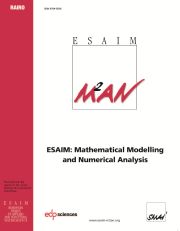Article contents
Mathematical modelling and numerical solution of swelling of cartilaginous tissues.Part I: Modelling of incompressible charged porous media
Published online by Cambridge University Press: 04 October 2007
Abstract
The swelling and shrinkage of biological tissues are modelled by a four-component mixture theory in which a deformable and charged porous medium is saturated with a fluid with dissolved ions. Four components are defined: solid, liquid, cations and anions. The aim of this paper is the construction of the Lagrangian model of the four-component system. It is shown that, with the choice of Lagrangian description of the solid skeleton, the motion of the other components can be described in terms of Lagrangian initial system of the solid skeleton as well. Such an approach has a particularly important bearing on computer-aided calculations. Balance laws are derived for each component and for the whole mixture. In cooperation of the second law of thermodynamics, the constitutive equations are given. This theory results in a coupled system of nonlinear parabolic differential equations together with an algebraic constraint for electroneutrality. In this model, it is desirable to obtain an accurate approximation of the fluid flow and ions flow. Such an accurate approximation can be determined by the mixed finite element method. Part II is devoted to this task.
- Type
- Research Article
- Information
- ESAIM: Mathematical Modelling and Numerical Analysis , Volume 41 , Issue 4 , July 2007 , pp. 661 - 678
- Copyright
- © EDP Sciences, SMAI, 2007
References
- 10
- Cited by


